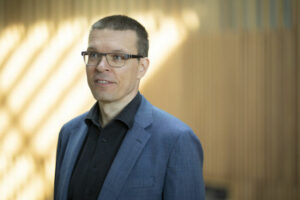Using AI to tackle humanity’s greatest challenges – such as climate change
 Human-focussed artificial intelligence can play a key role in tackling existential issues such as climate change, says Sami Kaski, Professor of Artificial Intelligence at The University of Manchester.
Human-focussed artificial intelligence can play a key role in tackling existential issues such as climate change, says Sami Kaski, Professor of Artificial Intelligence at The University of Manchester.
Professor Kaski has been working with an international team of colleagues to create a pioneering research platform called ‘Virtual Labs’ which uses autonomous AI to retrieve and share relevant knowledge with research teams around the world who are now in a race to mitigate the impact of climate change.
“Virtual Labs will help researchers seamlessly operate with physical and virtual assets working in close collaboration with AI-powered research assistants,” explained Professor Kaski.
“These trusted assistants will be able to access a vast library of knowledge around relevant topics and issues – the aim is that this will accelerate the pace of delivery while, at the same time, improving the quality of research.
“If relevant published knowledge already exists on computational research platforms or retained as academic ‘know-how’ – what we call tacit knowledge – it should be easily accessible so research teams worldwide can build on the progress others have made towards the same solution, or have missed someone else’s eureka moment on what could be a critical area of research. We haven’t the time to re-invent wheels.”
This, says Professor Kaski, will help fast-track new research and innovation to support breakthroughs in diverse areas of study, from the development of new advanced materials to the design of new drugs.
“The overarching aim of our ‘Virtual Labs’ concept is to use AI to help human scientists and engineers work towards a “common good”.
“We believe it has the potential to tackle some of the biggest challenges that humanity faces at a faster pace than before, such as climate change, sustainability, health and societal well-being.”
Professor Kaski has been working with colleagues based in the Finnish Centre for Artificial Intelligence (FCAI) and the UK, including the Alan Turing Institute.
